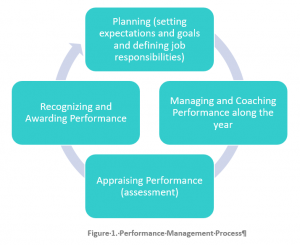Development Goals. The Right Way to Keep Your Team Engaged!
How many articles or blog posts have you read lately regarding leadership, how to keep company’s employees happy and engaged? I can tell you that I have read loads and some of them are extremely good. You can see in social media how many likes they get and the hundred of comments agreeing with their content.
But what is the problem then?
Why are there still so many demotivated employees around?
If you are interested to learn more, please keep on reading this article. It will teach you how to develop great development goals and make your team happier and more engaged than they have ever been!
 We have entered a new year, your final performance assessment evaluations should have been completed, or they are about to, and now the only thing that is left to do is set up your new performance and development goals for the new year. One of the key points to motivate your team and have them engaged throughout the year is to create a thorough and realistic career development plan. This plan should be revisited and updated on an ongoing basis.
We have entered a new year, your final performance assessment evaluations should have been completed, or they are about to, and now the only thing that is left to do is set up your new performance and development goals for the new year. One of the key points to motivate your team and have them engaged throughout the year is to create a thorough and realistic career development plan. This plan should be revisited and updated on an ongoing basis.
This is not a task that you should take for granted. It requires a lot of time of preparation, thought and empathy to make it beneficial and successful for both parties. Empathy means thoughtfully considering your direct reports feelings. A skill that unfortunately not so many people have.
The Performance Management Process
The four main components of the performance management process are part of a continuous cycle and feedback and it is not a once year event (ref. Figure 1).
Performance management is not the same thing as performance review. The performance appraisal is only a part of the whole process.
Performance management includes two kinds of goals: performance and development. The main aspect to understand is that performance goals will only be achieved by working on development goals because they define the skills, knowledge and experiences the employee needs to either remain effective in the current position or support the employee’s ability to take on new responsibilities and grow in his/her career. However, development goals are not always identified and rarely reviewed. Shocking, right?

It is key to identify the short-term development goals that will contribute to the long-term professional interests of your team, their career development plan.
You should consider the following:
- Are you aware of your direct reports career interests? What are their strengths contributing to these career goals and what areas need to be developed further?
- Do you know of other tasks that would help your direct reports reach their developmental goals? What has helped you in the past? Put yourself in their shoes.
- Can you make changes to your direct reports job assignments to replace routine tasks with new and bigger responsibilities that are more closely aligned with their goals?
- Are there people you know within the organization who could help your direct reports meet their career development goals? Finding a good coach that is willing to help is a great option. An external training course may not be the only way to develop & train employees. The development that is provided in-house is often more effective.
The process
Schedule a first one-to-one meeting with your direct reports. Keep in mind that you may need a few meetings before the career development plan is finalized. Ask them to think in advance about their options for growth and development and how they see their career expansion within the company. Encourage them to think about how they would like to see their careers progress.
Your direct reports must come prepared to discuss their career growth goals they aim to achieve within two to three years’ time and the short-term goals they would like to accomplish within the year. This is not an easy task since it requires deep self-analyzing. The plan must be developed with your direct reports’ involvement.
As a functional manager your job is to know all the options available to your direct reports, such as on-the-job training as well as mentoring and coaching on certain skills. Figure out challenging assignments.
Manager and direct report communication is critical. Make it a two-way conversation process throughout the year
Once the career development plan is finalized, you should start focusing on the short-term development goals and related action plans. Agree on dates for progress assessments and how progression will be measured. Remember to follow the SMART or SMARTER method (Specific, Measurable, Achievable, Relevant, Time-bound, Evaluated, Reviewed) to setup goals. Be careful with the goals you decide to set, and the way you will measure success. Otherwise, you can suffer the consequences at a later stage when it turns out that SMART goals were not as smart and they did not work as predicted.
Things to avoid
Don’t do their work. The career development plan belongs to the employee. You can help them to explore the options they have but they are ultimately responsible for their choices and follow-up. Guide your team in certain directions but let them find choices to improve their skills.
Don’t let your ups and downs affect your team. It is very difficult to motivate somebody when you are not motivated yourself, but your team comes first. It could be the case that you were forced to be a functional manager beyond your control but keep always in mind that your team is your responsibility and you have to fight for them, help them grow and be supportive throughout the year. Companies should put more effort on training and helping their managers on how to manage performance. Unfortunately, not everybody is born with that talent!
Never make promises since nothing is guaranteed. Your team should understand and trust that you will do your best to help them grow; however, there may be other circumstances (e.g. company’s economic situation, merges that force to change the company’s priorities and goals) which can impact on the employees desired development paths. Clear and open communication is essential when facing these types of situations. Otherwise, the team will lose trust on the management team. Be clear and transparent!
Don’t postpone at last minute or move continuously regular evaluation meetings with your direct reports. It can be interpreted as a lack of commitment from your side and consequently you will demotivate your team. Take it seriously!
Don’t rely on your memory. Sometimes we are just good remembering the bad stuff, while forgetting the good things. Keep a file on each person who reports to you and make regular notes for you regarding your team progress. Recommend your team to do the same.
Conclusion
Good performance management can only be understood as part of day-to-day work life. Instead of limiting the progress assessment to an annual performance review, you should schedule more routine meetings, incorporate ongoing feedback and keep on identifying and providing learning and development opportunities. During one to one sessions with your team, you must listen to what frustrates them. You should encourage people to speak more openly about their frustrations and help them to raise constructive complaints.
Do not forget that employees need regular feedback on how they are doing. What they are doing well and those aspects that need improvement.
Coaching and mentoring will not always contribute to better performance, but it will increase job satisfaction and decrease turnover. You should know when to demand better performance and when to hold back.
The way you motivate your direct reports will demonstrate your empathy towards them.
Author: Dr Leire Zúñiga, Director and Principal GCP Consultant
PHARMITY, 4th January 2019


